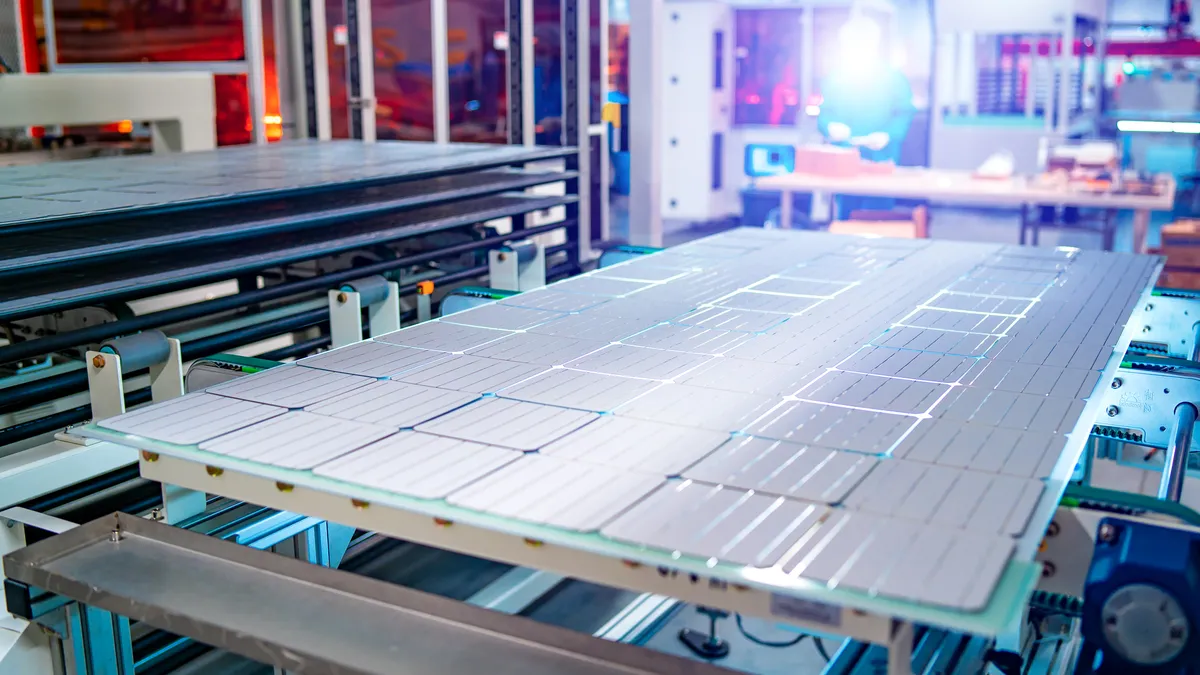Dive Brief:
- Auxin Solar filed a petition on Monday with the U.S. Department of Commerce for a review of solar panel imports from four Southeast Asian countries, seeking "fair pricing" for panels assembled with cheaper Chinese-produced parts.
- The California-based solar panel assembly company claims that the region circumvents antidumping and countervailing duties for solar parts produced in China established in 2012. Auxin requested an anti-circumvention inquiry of solar cells and modules assembled in Malaysia, Thailand, Vietnam and Cambodia with parts from China.
- The Department of Commerce denied a similar petition in 2021 from American Solar Manufacturers Against Chinese Circumvention, which requested a review of a number of Chinese companies working in Malaysia, Thailand and Vietnam. The agency rejected the request because the solar coalition, represented by the law firm Wiley Rein, had not publicly disclosed the names of its members.
Dive Insight:
U.S. solar developers let out a collective sigh of relief last week, when the Biden administration eased the Section 201 tariffs in place for solar.
The new Auxin petition could lead to higher prices from solar panels purchased from those Southeast countries, which make up a significant amount of U.S. imports. Some renewable energy trade groups view this latest petition as an attempt to stymie ongoing solar development.
The American Clean Power Association (ACP) called the petition "meritless" and "a costly distraction from the need to quickly deploy renewable energy at scale."
"This frivolous action could drive up consumers’ energy bills and risks slowing down economic growth and opportunities to create good-paying jobs across the country," ACP CEO Heather Zichal said in a statement.
Auxin Solar, as previous petitioners, claims further tariffs would boost domestic manufacturing, but the United States is dependent on solar module imports to meet growing demand. U.S. solar panel assembly facilities have the capacity to make under 8.5 GW of solar panels, and are expected to expand capacity by less than 6 GW as of January, according to data collected by Solar Power World.
That amount is dwarfed by the new solar generation already expected on the grid this year. Auxin wrote in its petition that domestic producers "would have much more capacity if they could sell [crystalline silicon photovoltaic (CSPV)] modules under fair competitive conditions."
"At present, cheap CSPV cell and module imports from Malaysia, Thailand, Vietnam, and Cambodia that utilize inputs from affiliated Chinese suppliers continue to undercut domestic producer pricing at key accounts and limit the ability for Auxin Solar to reinvest and expand its production," according to the filing.
Auxin has been actively seeking higher duties for solar imports, petitioning the U.S. International Trade Commission with U.S. module manufacturer Suniva last year for an extension of the tariffs.
The Solar Energy Industries Association (SEIA) is "aggressively" opposing the petition.
“This is yet another attempt to abuse U.S. trade laws and cause serious economic harm to the American solar industry and its 230,000 workers, shockingly, all at the behest of a single company," Abigail Ross Hopper, president and CEO of SEIA, said in a statement.
SEIA maintains that the sector should focus on an investment in U.S. manufacturing.
“As President Biden recognized just last week, there is a way to increase American manufacturing in the solar supply chain and it is an approach that has widespread support," Ross Hopper said, noting Senator Jon Ossoff's, D-Georgia, Solar Energy Manufacturing for America Act.
“This frivolous, self-interested petition could derail the entire American solar energy industry and disable efforts to tackle the climate crisis.”
"Although similar [to the petition filed last year] in broad brush strokes, Auxin’s petition includes new factual information, additional and different trade flows demonstrating circumvention is occurring through diversion of inputs from China to the subject countries, alleges circumvention on a country-wide basis, and identifies more companies operating in these countries that are circumventing," according to a company spokesperson.
The Department of Commerce will decide within a month whether to approve the request.














